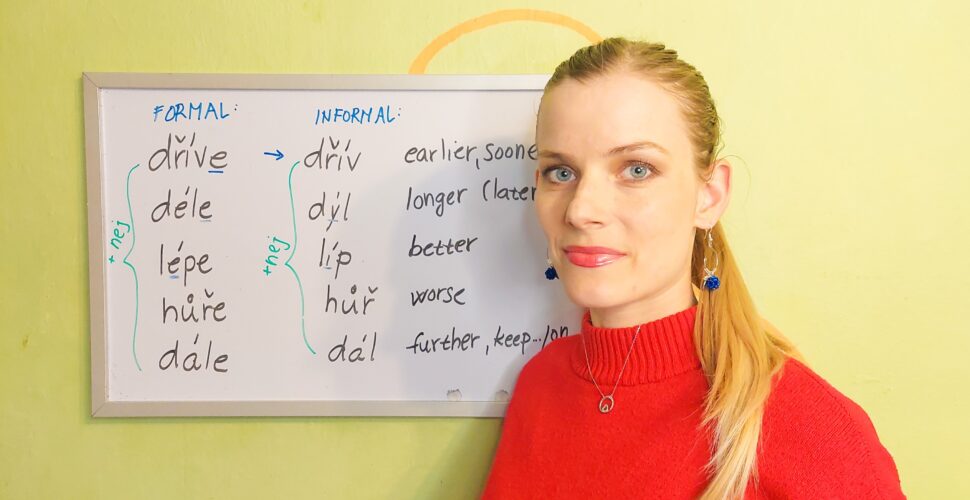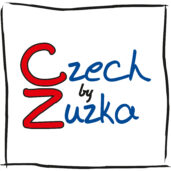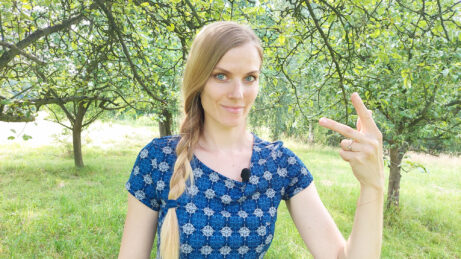
Shorter Words in Informal Czech
In Czech, some words have two forms with the same meaning. Sometimes the longer form is informal, while in other cases, it’s the shorter one that’s informal. Let’s take a look at the latter! The shorter forms of the words in this post are more common for spoken Czech.
Let’s start with the adverbs. The following words are in the comparative form and can be shortened in the superlative form too:
Comparative forms:
dříve ➡ dřív (earlier, sooner)
déle ➡ dýl (longer, later)
lépe ➡ líp (better)
hůře ➡ hůř (worse)
dále ➡ dál (further; on)
méně ➡ míň (less)
více ➡ víc (more)
snáze (snadněji) ➡ snáz (more easily)
spíše ➡ spíš (more likely, rather)
raději ➡ raděj/radši (preferably, rather)
Superlative forms:
nejdříve ➡ nejdřív (first, soonest)
nejdéle ➡ nejdýl (the longest)
nejlépe ➡ nejlíp (the best, in the best way)
nejhůře ➡ nejhůř (the worst, in the worst way)
nejdále ➡ nejdál (the furthest)
nejméně ➡ nejmíň (the least)
nejvíce ➡ nejvíc (the most)
nejsnáze (nejsnadněji) ➡ nejsnáz (the most easily)
nejspíše ➡ nejspíš (most likely)
nejraději ➡ nejraděj/nejradši (to like the best)
Examples:
- Uděláme to co nejdřív. We’ll do it as soon as possible.
- Kdo to vydrží dýl? Who can last longer?
- Čím dřív, tím líp! The sooner, the better!
- Ve tmě vidím hůř. I see worse in the dark.
- Čti dál. Keep reading.
- Bylo tam míň lidí. There were fewer people.
- Dej tam víc mouky. Add more flour.
- Takhle to půjde snáz. It’ll be easier this way.
- To bude vědět spíš děda. Grandpa will probably know that better.
- Já bych se na to nejradši vykašlal! I’d rather just forget about it!
Let’s take a look at more examples of words that act in the same way. The only difference is that the category below does not have comparative and superlative forms.
teprve ➡ teprv (only just)
naposledy ➡ naposled (last time)
alespoň ➡ aspoň (at least)
zase ➡ zas (again)
jako ➡ jak (like/as = simile, not for function)
Examples:
- Jsou teprv čtyři a už je tma. It’s only just four o’clock, and it’s already dark.
- Kdy jsi tady byla naposled? When were you here last?
- Tak si dáme aspoň něco k pití. So let’s at least have something to drink.
- Kdo to zas zvoní? Who’s ringing again?
- Mám hlad jak vlk! I’m as hungry as a wolf!
Watch this topic in my YouTube video!
So, how do we know whether to use the shorter or the longer form? It all depends on the situation. In spoken Czech, we often use the shorter version of the words you’ve seen in this article. However, it also depends on the speaker. Sometimes it just feels right to use the longer version because it fits the rhythm. One thing is for certain, though: if you need to be formal (writing a formal letter or preparing a formal speech), do not use these short forms!
Try this exercise to see if you remember what you have learned:








